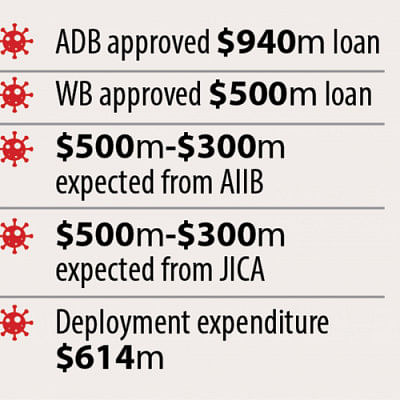Implementation of Mass Vaccination Plan: Govt needs $3.7b in next 2 years


Bangladesh will need an estimated $3.7 billion to inoculate 80 percent of the population against Covid in one and a half to two years and achieve herd immunity.
The government gave this estimate to the Asian Development Bank (ADB) in June while chalking out plans to buy the vaccine shots and delivering the jabs to the people.
Officials believe that about 10 percent of the vaccines would go to waste.
The government will need to inoculate 10 to 12 million people every month to reach the target of administering over 300 million shots. It has so far administered a measly 11.8 million, largely due to supply shortage.
Taking into account the promises made by the ADB and the World Bank, Bangladesh would need to spend over $2 billion to finance the vaccination programme.
According to Unicef, each of the vaccine doses could cost $4 to $40, depending on the manufacturer and supplier, due to market volatility. But the government estimate was made considering the prices to be between $4 and $20 per shot.
The government, however, expects to get loans from the development partners to inoculate around half the target population.
The ADB has already approved a loan package of $940 million under the three year "Responsive Covid-19 Vaccines for Recovery Project". Half the loan has to be repaid at 2 percent interest in 15 years and the other half in 25 years, said finance ministry officials.
This will enable the government to buy and administer an estimated 44.7 million doses by 2024.
The vaccines can be secured through Covax, Unicef, or bilateral arrangements with vaccine manufacturers and distributors, said the officials.
The World Bank also approved $500 million to help Bangladesh buy vaccines and expand vaccine storage facilities.
The loan is repayable in 30 years at a rate of 1.25 percent interest.
A finance ministry official said that the government expects to get at least $300 million each from Asian Infrastructure Investment Bank and Japan International Cooperation Agency.
"Fund is not a major issue as we have already started receiving money from development partners. But getting hold of the vaccine is a major challenge now," said a high official of the finance ministry, wishing anonymity.
The government has reached out to various countries to secure vaccines, said the official, adding, "We hope to get a large volume soon."
The government came up with a roadmap for vaccination in December last year, detailing financing and implementation steps for inoculating 138.2 million people, about 80 percent of the population. The plan also aims to vaccinate 80 percent of the Rohingya refugees in Bangladesh.
Covax programme, a global arrangement led by the World Health Organisation, will provide 76.7 million doses as a grant at an indicative price of $7 per dose. Bangladesh has so far received 1,61,000 Pfizer and Moderna jabs from the programme.
The government also asked Covax for an additional 100 million shots on a cost-sharing basis.
The government also bought 30 million shots from Serum Institute of India, but received only 7 million.
China is expected to provide 40 million shots and Russia 10 million.
India and China already delivered 4.4 million jabs as gifts.
Bangladesh has so far received 21.2 million shots in total.
The country's mass vaccination programme came to a halt after Serum stopped delivering the doses in April.
Now that it is getting vaccines from various sources, it has not only resumed the programme this month but has also focused on remote areas and made 25-year-olds-and-up eligible to get the shots.
The move comes hot on the heels of a surge in Covid deaths and infections caused by the Delta variant. Over 20,000 people have lost to Covid so far.
The positivity rate has been hovering around a staggering 30 percent for weeks with over 10,000 people being reported infected every day.
Health Minister Zahid Maleque recently said that the government was expecting around 210 million shots of Covid-19 vaccines early next year.


 For all latest news, follow The Daily Star's Google News channel.
For all latest news, follow The Daily Star's Google News channel. 



Comments